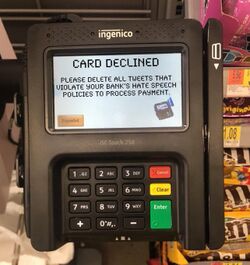Difference between revisions of "Social credit system"
(starting article) |
m (Text replacement - "CO2" to "CO<sub>2</sub>") |
||
| (2 intermediate revisions by 2 users not shown) | |||
| Line 2: | Line 2: | ||
|wikipedia=https://en.wikipedia.org/wiki/Social_Credit_System | |wikipedia=https://en.wikipedia.org/wiki/Social_Credit_System | ||
|sourcewatch= | |sourcewatch= | ||
| + | |image=Social_Credit_-_Transaction_DENIED_-_Please_Delete_your_Tweets_.jpg | ||
|constitutes=surveillance technology,social control | |constitutes=surveillance technology,social control | ||
|interests=vaccine passport,zero growth economy | |interests=vaccine passport,zero growth economy | ||
| Line 11: | Line 12: | ||
|members= | |members= | ||
}} | }} | ||
| − | A system of '''reward and punishment mechanisms''' for the government to control its citizens. The system is based on data collection, surveillance and combination of databases (including social media), leading to a final score, which resembles [[Facebook]] likes. Except, if nobody 'likes' you, you won't be able to fly, ride a train and you pay higher taxes. | + | A system of '''reward and punishment mechanisms''' for the government to control its citizens. The system is based on data collection, surveillance and combination of databases (including social media), leading to a final score, which resembles [[Facebook]] likes. Except, if nobody 'likes' you, you won't be able to fly, ride a train and you pay higher taxes. This has already been implemented in [[China]]<ref>"China bans 23m from buying travel tickets as part of 'social credit' system." https://www.theguardian.com/world/2019/mar/01/china-bans-23m-discredited-citizens-from-buying-travel-tickets-social-credit-system</ref>. |
| − | + | With the introduction of [[vaccine passports]] the [[supranational deep state]] has essentially introduced a global social credit system starting in 2021. | |
| − | |||
| − | The | + | ==Carbon limit reached== |
| − | + | [[image:Transaction denied Carbon limit reached.jpg|thumb]] | |
| − | + | The companu [[Doconomy]] together with [[Mastercard]] and the [[United Nations Framework Convention on Climate Change]] (UNFCCC) created a [[credit card]] that works hand-in-hand with a phone app, launched in April 2019, that quantifies the [[CO₂ emissions]] generated from each credit card transaction, setting monthly CO<sub>2</sub> limits – ensuring your carbon footprint is cut by 50 per cent – it will literally deny cardholders from spending once they have used up their allowance. Every purchase has a carbon footprint attached, which is displayed on the Doconomy app.<ref name=globe/> | |
| − | + | "The core purpose is the ability, not only to measure the impact of your consumption, but also to bring it to a direct halt,” the company stated. The website currently features a sneak peek of the message the card user will be met with as soon as they hit their carbon max, warning: “Transaction denied! Carbon limit reached.”<ref name=globe>https://globetrender.com/2020/04/07/doconomy-credit-card-carbon-limit/</ref><ref>https://www.lifesitenews.com/news/transaction-denied-get-ready-for-credit-card-that-cuts-off-spending-once-you-hit-your-co2-max/</ref> | |
| − | The | + | |
| + | The DO card comes at the same time as an August 2021 [[Nature]] study “calling for ‘carbon allowances’ that would monitor individuals’ CO<sub>2</sub> emissions through smart meters and tracking apps.”<ref>https://www.nature.com/articles/s41893-021-00756-w</ref> | ||
| − | |||
| − | |||
| − | |||
| − | |||
| − | |||
| − | |||
{{SMWDocs}} | {{SMWDocs}} | ||
Latest revision as of 09:17, 30 September 2022
(surveillance technology, social control) | |
|---|---|
 | |
| Interest of | "Smart city" |
| Subpage(s) | •Social credit system/China |
| A system of reward and punishment mechanisms for the government to control its citizens. | |
A system of reward and punishment mechanisms for the government to control its citizens. The system is based on data collection, surveillance and combination of databases (including social media), leading to a final score, which resembles Facebook likes. Except, if nobody 'likes' you, you won't be able to fly, ride a train and you pay higher taxes. This has already been implemented in China[1].
With the introduction of vaccine passports the supranational deep state has essentially introduced a global social credit system starting in 2021.
Carbon limit reached
The companu Doconomy together with Mastercard and the United Nations Framework Convention on Climate Change (UNFCCC) created a credit card that works hand-in-hand with a phone app, launched in April 2019, that quantifies the CO₂ emissions generated from each credit card transaction, setting monthly CO2 limits – ensuring your carbon footprint is cut by 50 per cent – it will literally deny cardholders from spending once they have used up their allowance. Every purchase has a carbon footprint attached, which is displayed on the Doconomy app.[2]
"The core purpose is the ability, not only to measure the impact of your consumption, but also to bring it to a direct halt,” the company stated. The website currently features a sneak peek of the message the card user will be met with as soon as they hit their carbon max, warning: “Transaction denied! Carbon limit reached.”[2][3]
The DO card comes at the same time as an August 2021 Nature study “calling for ‘carbon allowances’ that would monitor individuals’ CO2 emissions through smart meters and tracking apps.”[4]
References
- ↑ "China bans 23m from buying travel tickets as part of 'social credit' system." https://www.theguardian.com/world/2019/mar/01/china-bans-23m-discredited-citizens-from-buying-travel-tickets-social-credit-system
- ↑ a b https://globetrender.com/2020/04/07/doconomy-credit-card-carbon-limit/
- ↑ https://www.lifesitenews.com/news/transaction-denied-get-ready-for-credit-card-that-cuts-off-spending-once-you-hit-your-co2-max/
- ↑ https://www.nature.com/articles/s41893-021-00756-w
